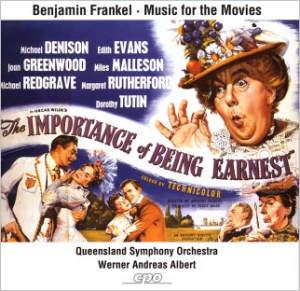************************************************************** EDITOR’s RECOMMENDATION May 2002 **************************************************************
Benjamin FRANKEL
Film Music: The Importance of Being Ernest; The Curse of the Werewolf; The Night of the Iguana; Trottie True; The Years Between; Footsteps in the Fog
Queensland Symphony Orchestra conducted by Werner Andreas Albert
CPO 999 809-2 [67:15]

Following 2000's re-recording of Benjamin Frankel's final film score, The Battle of the Bulge (1965), Music for the Movies - The Importance of Being Ernest offers themes and suites from six more films for which the composer penned the music. The forces are the same, Werner Andreas Albert conducting the Queensland Symphony Orchestra, who apart from the previous album have delivered a cycle of Frankel's symphonies as well as various other classical works, and thus can be considered expert in this composer's particular idioms. Let me note right away that the recording is first rate, with every detail coming through with great clarity and the orchestra having a real sense of presence and physical weight in the louder passages, intimacy and detail in the more introspective moments.
That Frankel is not better known among film music fans is hardly surprising. Until the 2000 album virtually none of his film music was available on disc, and very little ever has been. He stopped writing for the cinema in 1965, just as the soundtrack album was becoming a regular accompaniment to just about any major picture, choosing to concentrate on his classical career. With symphonic scores going out of fashion at the same time Frankel rather fell through the cracks as far as film music devotees were concerned. However, due very largely to the tireless efforts of the composer's stepson, Dimitri Kennaway, who wrote the excellent liner notes for this current issue as well as providing the arrangement of the lullaby from The Years Between (1946), all that is now happily changing. This new disc gives us the opportunity to hear a wider range of music than The Battle of the Bulge, and while it does not have the epic pounding drama of that release it will find great favour both with followers of light music and those attuned to melodic, thoughtful, often melancholy British film music.
First up is a jolly and perky seven minute suite from The Importance of Being Ernest - the 1952 version starring Michael Redgrave, Michael Denison and Joan Greenwood. This can perhaps best be characterised as light music, a genre undergoing something of a revival. Throughout the music is filled with the kind of jaunty, carefree melody, at times laced with humorous touches long associated with Ealing comedy and frequently the victim of modern TV comedy pastiche. A whimsical delight, it makes one long to see the film again.
Though only just over two minutes long the pastoral from the 1960 Curse of the Werewolf is a real highlight. Britain's first serial score, though you wouldn't know it from this extract. Frankel's interlude is a truly lovely piece, a lyrical gem filled with love of nature and hopeful romance.
Central to the disc is the complete score, some 25 minutes divided into ten cues, from The Night of the Iguana, the 1964 adaptation of the Tenasee Williams' play starring Richard Burton and Ava Gardner. An imaginatively scored work of magical glistening textures and tentative fragments of dreamlike melody, it caputres the sense of Americans fare from home, caught between desire and duty in a sultry Mexico. It is certainly worth the price of the album alone, the delicate use of percussion to underscore character rather than spectacle being some of the most creative in a film since Herrmann's Anna and the King of Siam (1946).
One thinks of Herrmann again, this time The Ghost and Mrs Muir, which Frankel predated by two years with this haunting lullaby from The Years Between. As presented in a reconstructed string arrangement this is three minutes of resigned, haunted melody which refuses to leave the memory.
Completing the disc are two extensive suites. The 13 minutes from Trottie True, a forgotten music hall drama made in 1949, compliment the suite from The Importance of Being Ernest; colourful, gay music in the meaning of the word when the music was written. There is an infectious fairground atmosphere and again an upbeat light music sensibility which will not please all tastes, is perhaps easy to mock, but which is wonderfully well crafted.
Rather more appealing to modern sensibilities is the closing 14 minute suite from Footsteps in the Fog (1955), a psychological thriller with a Victorian setting. The plot comes from the Gaslight genre and Frankel gave it a score which could have graced a Hitchcock classic. The main theme has a yearning quality of romantic nostalgia which is simply indelible. Divided into four movements, the suite presents approximately half the complete score, and ranging from sweeping romance to strong suspense writing makes a most appealing work in its own right. The 14 minutes contain more riches than virtually any recent score album, from the delightful "Lily Watkin's Theme" to the anything-Herrmann-can-do menace of "Lowry's Secret" to the urgent emotion of the stirring "Finale".
This is a release which really does belong in any decent film music collection. Get a copy soon and discover one of the best kept secrets in cinema - the music of Benjamin Frankel.
Gary S. Dalkin

Return to Index